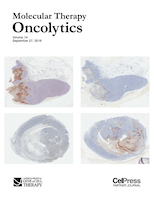
Molecular Therapy Oncolytics
Scope & Guideline
Transforming Cancer Care Through Innovative Research
Introduction
Aims and Scopes
- Oncolytic Virotherapy:
Exploring the use of viruses engineered to selectively target and destroy cancer cells while stimulating an immune response against tumors. - Gene Therapy:
Investigating the application of gene editing technologies, such as CRISPR, to correct genetic defects in cancer cells or to introduce therapeutic genes to enhance anti-tumor immunity. - Immunotherapy:
Focusing on strategies that harness the body’s immune system to fight cancer, including CAR-T cell therapy, immune checkpoint inhibitors, and the use of immune modulators. - Targeted Therapies:
Developing treatments that specifically target molecular pathways involved in cancer progression, such as receptor tyrosine kinases and metabolic pathways. - Tumor Microenvironment Interactions:
Studying how the tumor microenvironment influences cancer progression and therapy response, and exploring ways to modify it to improve therapeutic efficacy. - Extracellular Vesicles and Biomarkers:
Investigating the role of exosomes and other extracellular vesicles in cancer biology and their potential as biomarkers for diagnosis and treatment monitoring.
Trending and Emerging
- Combination Immunotherapy:
There is a growing trend towards combining different immunotherapeutic approaches, such as CAR-T cells with immune checkpoint inhibitors, to enhance treatment efficacy and overcome resistance. - Oncolytic Virus Engineering:
Research on the engineering of oncolytic viruses to improve their specificity and efficacy against various cancers is gaining traction, reflecting the innovative strategies being developed in virotherapy. - MicroRNA and Non-Coding RNA Therapies:
The exploration of microRNAs and other non-coding RNAs as therapeutic targets or agents is emerging, indicating a shift towards understanding gene regulation in cancer. - Personalized Medicine Approaches:
There is an increasing focus on personalized medicine, where treatments are tailored based on individual tumor genetics and patient profiles, leading to improved patient outcomes. - Tumor Microenvironment Modulation:
Research is trending towards strategies that target the tumor microenvironment to enhance drug delivery and immune response, emphasizing the complexity of tumor biology.
Declining or Waning
- Conventional Chemotherapy:
Research focusing solely on traditional chemotherapy methods has become less prevalent, as the field shifts towards more personalized and targeted treatment strategies. - Single-Agent Therapies:
Studies that emphasize the use of single-agent therapies without combining them with immunotherapy or other modalities are declining, as combination therapies are increasingly recognized as more effective. - Basic Mechanistic Studies:
There is a waning interest in purely mechanistic studies that do not translate into therapeutic applications, as the journal prioritizes research with direct clinical relevance. - Animal Models with Limited Relevance:
Research utilizing outdated or poorly characterized animal models that do not accurately represent human cancer biology is less frequently published, in favor of studies with more translational value.
Similar Journals
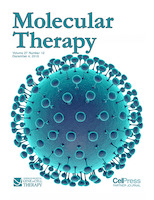
MOLECULAR THERAPY
Advancing molecular medicine for a healthier tomorrow.MOLECULAR THERAPY, published by CELL PRESS, is a distinguished journal in the field of molecular biology and therapy, renowned for its significant contributions to drug discovery, genetics, and pharmacology since its inception in 2000. This prestigious journal, which holds a commendable position in the Q1 category across multiple disciplines including Drug Discovery, Molecular Medicine, and Molecular Biology, facilitates cutting-edge research and innovative therapies that aim to improve patient outcomes. With an impressive Scopus ranking that places it among the top journals in its field—such as rank #6 in Drug Discovery and #8 in Pharmacology—MOLECULAR THERAPY is crucial for researchers, professionals, and students seeking to advance their understanding and application of molecular techniques. The journal welcomes high-quality submissions that explore the therapeutic potential of molecular mechanisms, fostering a collaborative spirit within the scientific community to push the boundaries of modern medicine.

Cancer Cell International
Unveiling Innovations in Cancer BiologyCancer Cell International, published by BMC, is a transformative open-access journal established in 2001, dedicated to advancing the field of oncology and cancer research. With its ISSN number not specified and an E-ISSN of 1475-2867, the journal proudly operates from the United Kingdom, located at CAMPUS, 4 Crinan St, London N1 9XW, England. Renowned for its rigorous peer-review process, Cancer Cell International has made significant strides, securing a Q2 ranking in Cancer Research and Q1 rankings in both Genetics and Oncology as of 2023. It ranks impressively in Scopus, featuring in the top quintile of Genetics (#37/347) and Oncology (#52/404), indicating its importance within the scientific community. The journal's broad scope caters to a diverse array of topics within cancer biology, making it an invaluable resource for researchers, professionals, and students seeking to stay at the forefront of cancer science. With a commitment to disseminating high-quality research, Cancer Cell International invites scholars to explore innovative findings and contribute to the collective effort of combating cancer.
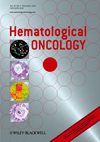
HEMATOLOGICAL ONCOLOGY
Advancing the Frontiers of Hematological ResearchHEMATOLOGICAL ONCOLOGY, published by Wiley, is a premier journal in the fields of cancer research, hematology, and oncology, with a rich history of publication dating back to 1983. With an impact factor indicative of its influential standing—ranking in the second quartile in multiple categories including Cancer Research, Hematology, and Oncology—this journal serves as a vital resource for researchers, clinicians, and students alike. HEMATOLOGICAL ONCOLOGY is based in the United Kingdom and focuses on the advancements and challenges in the understanding and treatment of hematological malignancies. While it does not offer open access options, its rigorous peer-review process ensures that all published articles are of the highest quality, contributing to the ongoing dialogue and research in this critical area of medicine. With its commitment to disseminating impactful research, HEMATOLOGICAL ONCOLOGY remains an essential platform for driving innovation and collaboration within the global scientific community.

CANCER CELL
Innovative Insights for Oncology ProfessionalsCancer Cell, published by Cell Press, represents a pinnacle of research in the fields of cancer research, cell biology, and oncology. With an impressive Impact Factor and ranking as Q1 in prestigious categories for both 2023 and previous years, this journal stands out as a vital resource for professionals and scholars dedicated to understanding the molecular underpinnings of cancer. Operating from Cambridge, MA, Cancer Cell has been an essential platform for innovative studies since its inception in 2002. Although it is not an Open Access journal, its rigorous peer-review process ensures that only the highest quality research is disseminated to the scientific community. Readers can expect to find a wealth of knowledge ranging from cutting-edge therapies to insights into tumor biology, thereby contributing significantly to the advancement of oncology. With rankings placing it among the top echelons of related fields—#2 in Cancer Research and #6 in Oncology—Cancer Cell is an indispensable reference for anyone committed to the fight against cancer.
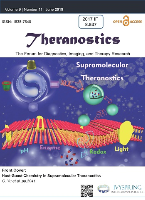
Theranostics
Empowering Research for Tomorrow's Therapies.Theranostics is a premier journal in the field of Medicine and Pharmacology, published by IVYSPRING INT PUBL. With its commitment to open access since 2011, it facilitates the widespread dissemination of innovative research, fostering collaboration and advancements in therapeutic diagnostics. The journal proudly holds a Q1 ranking in both Medicine (Miscellaneous) and Pharmacology, Toxicology and Pharmaceutics, as of 2023, showcasing its esteemed position within the scientific community. Recognized globally, it ranks in the top 1%, with Scopus rankings placing it as 4th out of 398 in Medicine and 1st out of 43 in Pharmacology. Theranostics serves as a crucial platform for researchers, professionals, and students to explore cutting-edge developments as it converges multidisciplinary approaches to enhance patient care and treatment efficacy. With a focus on bridging experimental research and clinical applications, the journal is instrumental in shaping future therapies and diagnostic strategies.

EXPERT REVIEWS IN MOLECULAR MEDICINE
Connecting Experts to Shape the Future of MedicineEXPERT REVIEWS IN MOLECULAR MEDICINE, published by Cambridge University Press, stands at the forefront of research in the fields of Molecular Biology and Molecular Medicine. With an impressive impact factor reflecting its Q1 status in both relevant categories, this journal serves as an essential platform for disseminating cutting-edge reviews and critical assessments that are vital for advancing our understanding of molecular mechanisms in health and disease. Established in 1997 and continuously evolving until 2024, it features contributions from leading experts that highlight emerging trends and innovative methodologies. Researchers, professionals, and students are encouraged to engage with the content, benefiting from the journal’s rigorous peer-review process and its commitment to academic excellence, making it a valuable resource within the scientific community.
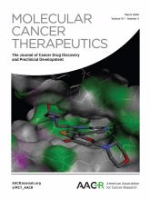
MOLECULAR CANCER THERAPEUTICS
Pioneering discoveries for a cancer-free tomorrow.MOLECULAR CANCER THERAPEUTICS, published by the American Association for Cancer Research, is a premier journal dedicated to advancing the field of cancer research and therapy since 2001. With a notable impact factor reflecting its high-quality content, this journal stands out in the Q1 category for both Cancer Research and Oncology as of 2023. Researchers, clinicians, and students interested in innovative treatment strategies and molecular mechanisms can find valuable insights within its pages, bolstered by a rigorous peer-review process and a global perspective on cancer therapeutic developments. Although the journal operates under a subscription model, it provides comprehensive access to cutting-edge studies and reviews that drive forward the understanding of cancer biology and treatment modalities. The journal's impressive Scopus rankings further validate its influence within both oncology and the broader cancer research community, making it an indispensable resource for anyone committed to combating cancer through science.

Cancer Communications
Unlocking Insights in Oncology for AllCancer Communications, published by WILEY, is a leading open-access journal that has positioned itself at the forefront of cancer research and oncology since its inception in 2017. With an impressive HIndex reflective of its scholarly impact and recognized in the Q1 category for both Cancer Research and Oncology as of 2023, this journal consistently ranks in the top echelons of its field, specifically at Rank #16/404 and Rank #13/230 in their respective categories on Scopus. Cancer Communications aims to disseminate cutting-edge research findings, innovative methodologies, and significant advancements in cancer treatments, thereby fostering a deeper understanding of oncology among researchers, healthcare professionals, and students. The journal operates under an Open Access model since 2018, ensuring that vital research is accessible to a global audience, thus enhancing collaboration and knowledge sharing necessary to tackle one of the most pressing health challenges of our time. Located in Hoboken, NJ, United States, and with a strong commitment to scientific excellence, Cancer Communications remains an essential resource for anyone engaged in the fight against cancer.
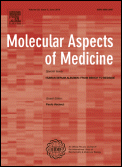
MOLECULAR ASPECTS OF MEDICINE
Bridging the Gap Between Biochemistry and MedicineMOLECULAR ASPECTS OF MEDICINE is a premier journal published by Elsevier, focusing on groundbreaking research in the fields of biochemistry, molecular biology, and medicine. With an impressive impact factor and ranking within the top quartile across multiple categories, including Q1 in Biochemistry, Clinical Biochemistry, and Molecular Medicine, it serves as an essential platform for sharing innovative findings that advance our understanding of molecular mechanisms in health and disease. The journal, which has been in publication since 1976, provides a diverse range of articles, addressing both fundamental and applied aspects of molecular medicine, thus appealing to a broad audience of researchers, professionals, and students. While MOLECULAR ASPECTS OF MEDICINE does not currently offer Open Access options, it remains a vital resource for accessing high-quality, peer-reviewed scholarly works that significantly contribute to the advancement of biomedical research.

Immunotherapy
Advancing the Future of Immune-Based TherapiesImmunotherapy, published by Future Medicine Ltd, is a leading journal focused on the evolving field of immunotherapy within the realms of immunology, oncology, and allergy. With an ISSN of 1750-743X and an E-ISSN of 1750-7448, this academic journal has been at the forefront of groundbreaking research since 2009, and continues to illuminating insights in a landscape critical for the development of innovative therapeutic strategies through 2024. Positioned within Q2 and Q3 quartiles in various relevant categories, the journal ranks commendably in Scopus metrics, exhibiting robust engagement and relevance in Oncology and Immunology. It serves as an essential resource for researchers, clinicians, and students eager to stay abreast of advancements in immunotherapy, while also providing an open platform for sharing impactful studies. By disseminating high-quality research, Immunotherapy fosters a global dialogue among professionals and contributes significantly to the scientific community's collective knowledge on the increasing role of immune-based therapies in disease management.